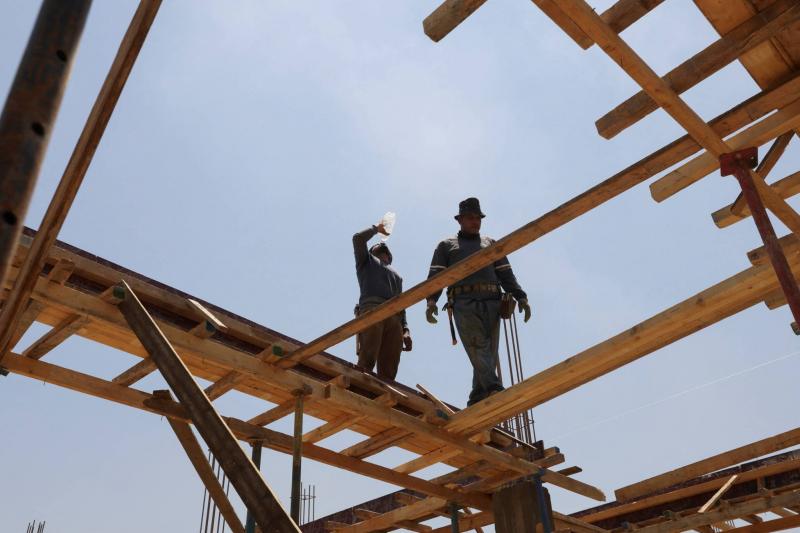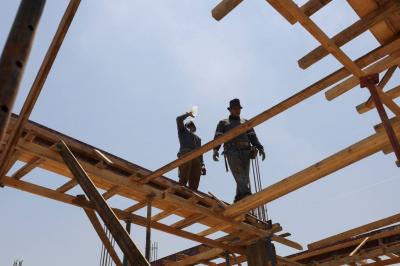The impact of hot and humid air masses concentrated over the Arabian Peninsula continues to affect Lebanon and the eastern Mediterranean basin, leading to a noticeable increase in temperatures, especially in the highlands and inland areas, where temperatures have surpassed 43 degrees Celsius (approximately 8 degrees above seasonal averages). This heat wave, according to the Meteorological Department at Rafic Hariri International Airport, is accompanied by high humidity levels, particularly along the coast, which makes the atmosphere hazy and intensifies the sensation of heat. The peak of this heat wave is expected today, Monday, with an increase in minimum temperatures along the coast and the possibility of isolated thunderstorm cells due to the rise of warm, humid air in the upper atmosphere, alongside occasional scattered rainfall. It is anticipated that its effect will diminish in mountainous and coastal areas starting tomorrow, Tuesday.
The heat wave affecting Lebanon has caused a fire in the outskirts of the towns of Meshmesh and Qommameen in Byblos. In Akkar, civil defense teams, in cooperation with locals, managed to control a large fire that broke out in the town of Harf Seiad in the Dinniyeh district before it spread due to strong winds to olive groves and agricultural lands. A number of fires have also been reported in the Central Beqaa and the south. The temperature averages for August: in Beirut, the temperatures range between 25 and 33 degrees Celsius, and in Zahle, between 18 and 35 degrees Celsius.
**Expected Weather in Lebanon:**
- **Monday:** Partly cloudy to occasionally cloudy with a decrease in temperature in the northern and mountainous areas, while remaining stable in other coastal regions, although still high above seasonal averages (by 8 degrees). Humidity levels remain high, especially on the coast, intensifying the sensation of heat. Winds may occasionally strengthen, leading to thick fog in the mid-elevations, which may reduce visibility. Scattered rainfall is expected occasionally, especially in the northern, southern, and inland areas, with a possibility of lightning and thunder.
- **Tuesday:** Partly cloudy to occasionally cloudy with thick fog in the mid-elevations and the possibility of occasional scattered rainfall, especially in the northern areas, with a chance of isolated thunderstorms. Temperatures will decrease further in mountainous areas, returning to seasonal averages, while remaining relatively unchanged on the coast, with high humidity levels persisting, which will enhance the sensation of heat. Inland areas will remain above average by about 6 degrees.
- **Wednesday:** Partly cloudy with fog on the highlands and a decrease in temperatures as the heat wave subsides, although it will still be above average by about 5 degrees. Light drizzle is expected during the morning in northern areas.
The severe heat wave is also affecting Jordan, which has taken measures to mitigate its impact as temperatures have exceeded 43 degrees Celsius in some governorates. Similarly, areas in Syria, the Palestinian territories, and Israel are experiencing temperatures above seasonal averages, with warnings of wildfire risks.
Iraq has recorded unprecedented temperatures exceeding 50 degrees in some areas. Oil investment companies in Basra raised the purple flag after temperatures surpassed 52 degrees Celsius. This flag indicates short-wave ultraviolet radiation, which poses the highest risk to humans, leading to heat strokes and killing living cells in the body. Many companies raise this warning signal to alert their workers to take extreme precautions. Previously, Iraq’s Meteorological Authority reported that 13 governorates recorded maximum temperatures exceeding 50 degrees Celsius.
It is noteworthy that UN High Commissioner for Human Rights Volker Turk warned on Wednesday that the rising temperatures and drought faced by Iraq serve as a "warning" for the entire world, concluding his visit to a country that is among the most vulnerable to certain effects of climate change. During his tour in Iraq, where temperatures surpassed 50 degrees amid severe drought, Turk visited the south, noting that "the fields are barren and suffering under the weight of drought." He concluded a four-day visit by emphasizing that "the rise in temperatures, drought, and loss of biodiversity are now a reality,” considering it a wake-up call for Iraq and the whole world. For the fourth consecutive year, Iraq, the fifth most affected country by climate change according to the UN, is facing a severe drought, attributed to decreased rainfall and rising temperatures. Authorities also hold part of the blame on dams built by Turkey and Iran on the sources of the Tigris and Euphrates Rivers, leading to a decrease in river levels that cross Iraq. In July, the United Nations Food and Agriculture Organization (FAO) warned that the historic marshlands in the south are experiencing "the most intense heat wave in 40 years," also mentioning a severe decrease in water levels.




